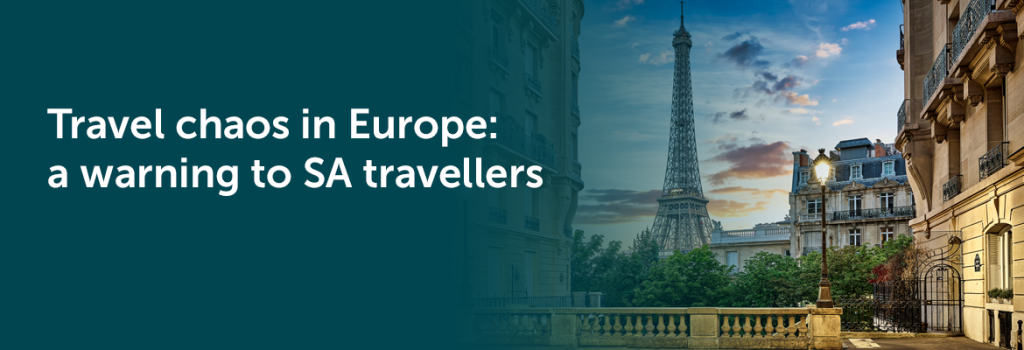
The travel industry has almost made a full recovery with travel numbers nearing pre-pandemic figures. But the return of travel is proving more difficult than most in the travel industry would have thought. Post-COVID staff shortages are severely impacting service delivery across the travel and tourism industry in Europe and the United States. And – unfortunately – South Africa is not immune to the disruptions.
Travellers in Europe are reporting flight cancellations, slow or lost bags, and huge queues at security and passport control. Especially Heathrow in the UK and Schiphol in the Netherlands are reporting disruptions. Meanwhile, in the US, American Airlines and United Airlines have announced a reduction of domestic services as the airlines are struggling with a lack of pilots.
“Just as we thought the travel industry could finally turn the corner as COVID restrictions are being lifted, we’re seeing a new round of disruptions,” says Oz Desai, GM Corporate Traveller. “All across Europe, airports are cutting back on the number of flights they can handle for the months ahead, which is heavily impacting flight availability. The number of flights cancelled in Europe every week is currently estimated at several thousand.”
The main reason for the disruptions is a lack of experienced and knowledgeable staff. The pandemic forced many in the travel industry to make drastic staff cuts to survive. Hundreds of thousands of aviation, hospitality and tourism workers were laid off, with years of experience and technical expertise removed from the industry. For example, US airlines shed more than 84,000 employees from February to October 2020, according to Bureau of Transportation Statistics data.
When demand for travel returned this year, a hiring frenzy began. However, talented individuals laid off in 2020 found employment elsewhere and are not in a hurry to return to the travel industry. The lack of knowledge and expertise is most acutely felt in the aviation industry but has also trickled down to the hospitality and car rental sectors. In addition, the ongoing war in Ukraine continues to severely restrict available airspace in Europe. This is leading to massive bottlenecks in the skies and thus, unfortunately, to further flight delays.
For business travellers, working with a reliable travel management company (TMC) has become more important than ever, says Desai. “Travel has become more complicated, fares have skyrocketed, visa delays are frequent and travellers want the reassurance of a professional at their side when they are faced with airline delays and cancellations or luggage mishaps. They’re looking to their TMC to make sure the suppliers they select will deliver on their promises.”
According to Desai, TMCs have seen demand for their services rise exponentially after the South African government relaxed most COVID regulations. Bookings are increasing as well as the amount of TMC work per booking because travel has become a lot more complicated.
At Business Travel Show Europe, one travel manager speaker mentioned that the average number of calls his travellers make to their TMC to arrange a trip has shot up from three pre-pandemic to 14 today. That aligned closely with figures supplied by Clive Wratten, chief executive of TMC body the Business Travel Association: his members reported an increase from four calls per booking to 14-20.
Travellers are also increasingly looking for human assistance simply because the travel landscape is so unreliable. At the Business Travel Show, some travellers mentioned they had bad experiences of booking hotels online only to find the hotel closed when arriving for check-in.
As a result of the increased pressure on TMCs, Desai says Corporate Traveller has taken several drastic measures including hiring more staff, adding more shifts for consultants to boost the always-on service, and upskilling current staff.
Although TMCs are working hard to make the traveller journey as seamless as possible, Desai explains it is important that companies and travellers take note of the current disruptions and also adjust their booking and travel behaviour. “We’re encouraging our clients to book as far in advance as possible. Not only will that help secure availability but it will also help the company manage travel costs,” says Desai.
Desai adds that companies should consider embracing technology once again, especially when it comes to simple itineraries. “Technology has become intuitive and hyper-personal. New booking tools are user-friendly and global, and travellers benefit from access to real-time, pertinent travel-safety information. Meanwhile, travel managers receive comprehensive traveller tracking capabilities – allowing them to immediately see who is travelling, when and where,” he says, adding that a consultant will always be available when needed.
It will take some time for things in the travel industry to normalise. Disruptions at airports in Europe and the US are likely to continue while the South African aviation space will take some time to adjust to the loss of kulula and Comair.
However, there is light at the end of the tunnel. “Almost every company in the travel and tourism industry has indicated they are in the process of recruiting new staff. Although this increase in capacity will only have its desired stabilising effect in a few months’ time, the industry is working towards a solution,” says Desai.
Lufthansa has indicated that by mid-2023, we can expect a much more reliable air transport system worldwide with more air capacity and modernised fleets. The airline is putting the A380 back to service from 2023 and has strengthened its fleet with 50 new long-haul aircraft and 60 new Airbus A320/321s in the next three years.
“The pandemic has taught us how to navigate uncertainties and deal with disruption. As long as we work together in an open and transparent way, we can minimise any travel friction and build a rewarding, profitable and enjoyable business travel experience,” Desai concludes.